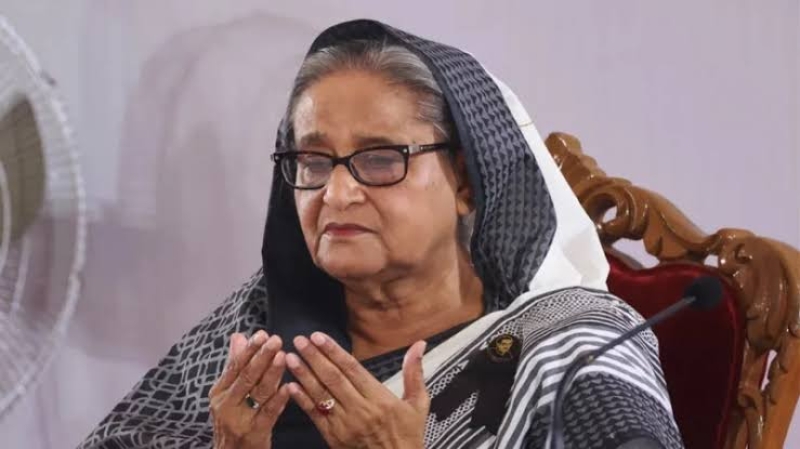- Five Shariah Banks to Merge Into State-run Sammilito Islami Bank |
- Dhaka’s air ‘unhealthy for sensitive groups’ Wednesday morning |
- US proposes that the UN authorize a Gaza stabilization force for 2 years |
- Democrat Zohran Mamdani is elected New York City mayor |
- Martyr Mugdha's brother Snigdha steps into politics with BNP |
Bangladesh Considers Sheikh Hasina's Return from India
Says Indian Analysts

Former PM Sheikh Hasina
The repatriation of former Bangladeshi Prime Minister Sheikh Hasina from India was brought up for discussion during a session at the Bay of Bengal Conversation on November 16, reports Prothom Alo. The event, held at the Pan Pacific Sonargaon hotel in Dhaka, included a significant dialogue on Bangladesh-India relations, where a Bangladeshi analyst raised the question of what Bangladesh should do regarding Hasina, who sought refuge in India after being ousted in a mass uprising on August 5.
During the session, one of the Bangladeshi participants sought advice on how the country should approach Hasina's return, given her flight to India following violent political unrest, which resulted in the deaths of nearly 1,500 people. The analyst implied that Hasina bore responsibility for the violence and questioned India's role in providing her sanctuary.
Indian analysts at the discussion suggested that any conversation about repatriation should be guided by legal processes. They emphasized that the matter could be addressed only after Bangladesh formally requested Hasina’s return under the bilateral extradition treaty.
The session was part of the three-day Bay of Bengal Conversation, organized by the Center for Governance Studies (CGS). A special segment of the forum focused on the complexities of Bangladesh-India relations, titled "Bridging Divides: Navigating the Complexities of India-Bangladesh Relations." The event was conducted under the Chatham House Rule, meaning that specific quotes could not be attributed to individuals but only to the general conversation.
The session featured prominent Bangladeshi analysts, including Ali Riaz, chair of the Constitutional Reform Commission and distinguished professor at Illinois State University; Nurul Kabir, editor of New Age; Fahmida Khatun, executive director of the Centre for Policy Dialogue (CPD); and Debashish Roy, head of the Chakma Circle, among others. On the Indian side, participants included former diplomats, academics, and experts on South Asian security and politics.
The discussion covered a wide range of issues affecting bilateral ties, including border killings, water-sharing agreements, trade, the Rohingya refugee crisis, cultural exchanges, and environmental concerns. Towards the end of the two-hour conversation, the topic of Sheikh Hasina's political exile in India emerged, with one Bangladeshi analyst asserting that Hasina’s flight followed the mass violence of August 5, questioning India's role in sheltering her.
In response, an Indian analyst acknowledged the importance of not treating one sensitive issue as a roadblock to broader bilateral discussions. He argued that a balanced approach was necessary and emphasized that legal channels should be explored before any diplomatic action could be taken. Another Indian analyst reiterated that, as per the existing legal framework, the matter could only proceed if Bangladesh made an official request for Hasina’s extradition.
The conversation took an unexpected turn when a Bangladeshi analyst noted it was the first mention of Hasina in the entire two-hour session. The Indian analyst, appearing to deflect the question, remarked that India had not received an official request for Hasina’s return and could not comment further. The exchange was briefly lightened when another Indian analyst jokingly offered asylum to Bangladeshi officials if they ever found themselves in a similar situation. This remark drew laughter from the participants.
The issue of Sheikh Hasina's exile remains a sensitive topic in Bangladesh-India relations. The former prime minister’s ousting in August followed widespread protests, and her subsequent flight to India marked a pivotal moment in the country’s political landscape. Although the matter of her potential repatriation remains unresolved, the discussion at the Bay of Bengal Conversation highlights the complexities surrounding such a request and the importance of legal protocols in resolving contentious issues.

